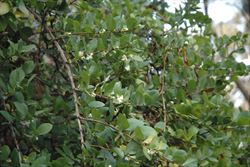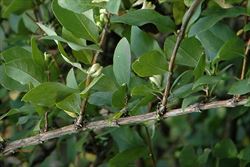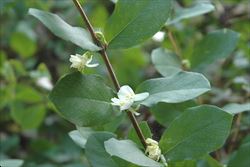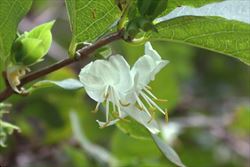Click on images to enlarge

habit (Photo: Rob and Fiona Richardson)

woody stems and leaves (Photo: Rob and Fiona Richardson)

leaves and flowers (Photo: Rob and Fiona Richardson)

close-up of flowers (Photo: Rob and Fiona Richardson)
Scientific Name
Lonicera fragrantissima Lindl. & Paxton
Family
Caprifoliaceae
Common Names
bush honeysuckle, fragrant honeysuckle, honeysuckle, January jasmine, shrubby honeysuckle, sweet breath of spring, sweet breath-of-spring, sweet-breath-of-spring, winter flowering honeysuckle, winter honeysuckle, winter-flowering honeysuckle
Origin
Native to eastern Asia (i.e. eastern China).
Naturalised Distribution
Occasionally naturalised on the southern and northern tablelands of New South Wales and sparingly naturalised in south-eastern Queensland. Also naturalised overseas in eastern USA.
Notes
Winter honeysuckle (Lonicera fragrantissima) is listed as a priority environmental weed in at least one Natural Resource Management region and appears on the local environmental weeds list for the Nillumbik Shire in Victoria. It is also regarded as a potential environmental weed or "sleeper weed" in other parts of eastern Australia. This species is an occasional garden escape and is mainly found in highland areas in eastern New south Wales at present.
Winter honeysuckle (Lonicera fragrantissima) readily invades open woodlands and disturbed sites in the USA. It is known to form dense thickets in the understorey vegetation which can restrict native plant growth and prevent overstorey regeneration. Its seeds are readily dispersed by birds and mammals and it may have the potential to cause similar problems to the closely related Japanese honeysuckle (Lonicera japonica).

